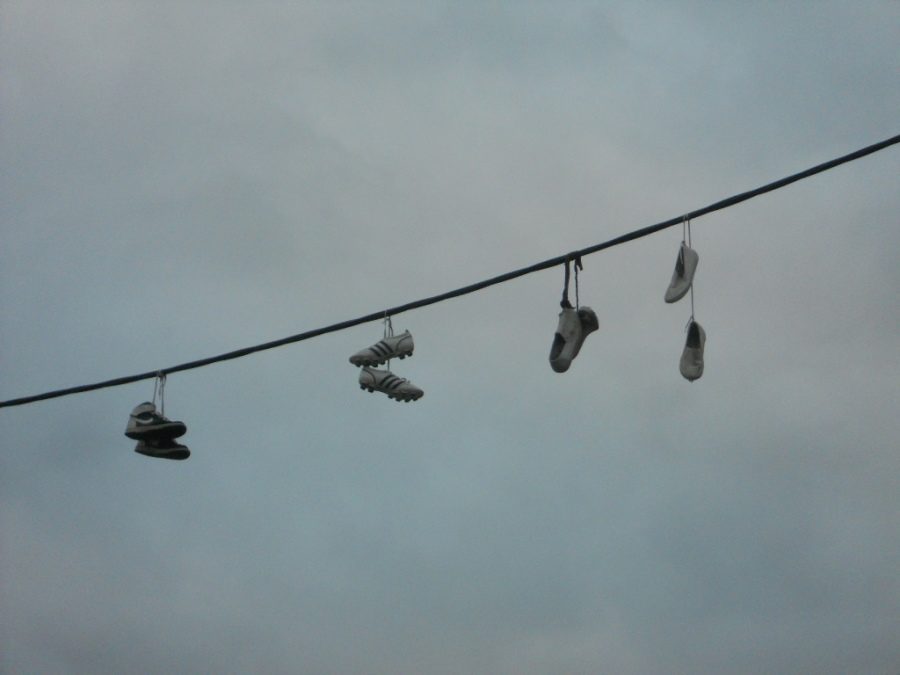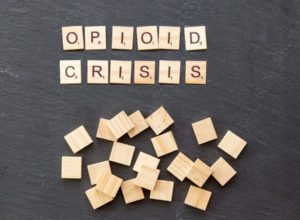Death penalty to drug dealers will not be a step forward
Photo via Flickr (Michael Coghlan) under Creative Commons license
Shoes tied up and slung across wires such as the picture shown above are a common sign that drug dealers are selling products nearby. However serious this problem is, putting the death penalty on the table will not do anything to help end this huge nationwide dilemma.
April 9, 2018
In one of President Trump’s most recent imprudent jargons, he began tackling the opioid epidemic by pointing out his plan — to give drug dealers the death penalty. This has been spoken about before, but the President has made this option clear in his New Hampshire event. “If we don’t get tough on the drug dealers, we’re wasting our time — just remember that, we’re wasting our time — and that toughness includes the death penalty,” Trump said.
“There’s no good evidence that tougher punishments or harsher supply-elimination efforts do a better job of driving down access to drugs and substance misuse than lighter penalties,” German Lopez wrote from a summary of a report from Peter Reuter at the University of Maryland and Harold Pollack at the University of Chicago.
Since 2000, there have been an estimated 500,000 opioid-related deaths and nearly 65,000 in 2016 alone. This drug crisis is no doubt a serious issue that needs to be diminished in any way possible.
However, health experts and even Trump himself call this situation a public health issue and this is the perspective it needs to be looked at before any other.
Dr. Guohua Li, a professor of epidemiology and anesthesiology at Columbia University, spoke about how uncertain he feels about such a penalty. He has studied this drug epidemic for over ten years, and said that this case is similar to the Ebola and Zika viruses. “The opioid crisis will ultimately be resolved through a public health approach by public health professionals working in the CDC, state and county health departments, and academic institutions in collaboration with other government agencies and community organizations across society,” Li said.
He continues to say that while the criminal justice system can be involved in this epidemic, depending on the criminal justice system to speak about public health problems will only result in expensive, counterproductive and useless outcomes.
When speaking about this situation, Trump said that he was mostly speaking about “the big pushers, the ones who really are killing people.” However, the problem with that is that “most U.S. drug enforcement treats everyone involved with moving drugs as serious criminals,” Dara Lind, a writer for Vox, said. “It can be hard to tell the difference between a dealer and a courier, much less between a dealer at the bottom of the food chain and a kingpin.” He concluded his argument by saying that in the end, the seriousness of the subject would not stop the incoming of drugs in this country.
There is a serious war on drugs in the Philippines as well. They have killed between 5,000 to 20,000 people involved in this “war.” However, there is “no proof that usage has actually decreased.”
“The number of drug so-called addicts — originally, they said it was 1.8 million, then President Duterte came up with the number of 3 million, then 4 million. Now his foreign secretary has said 7 million users. The more people they’ve killer the number of users keeps going up,” program director of the Drug Policy Project at the Institute for Policy Studies Sanho Tree said.
According to a Bureau of Justice Statistics study, about 30% of state prisoners are drug users as well as drug dealers. Therefore, in using Trump’s death penalty idea, he would also be harming the very people he should supposedly be saving.
Allowing the death penalty will only cause more problems than solutions to this intense dilema. Lawmakers and politicians of the United States must come up with tactics better than one that will only backtrack our progress in handling America’s drug problem.






